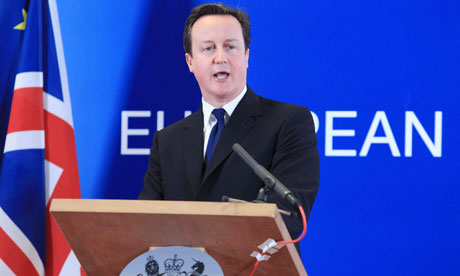Parliament is resurgent and a British bill of rights would be welcome, but 'constitutional chauvinism' will hurt Britain as well as the human rights convention
By Cian Murphy
guardian.co.uk, Thursday 17 February 2011 14.22 GMT
 David Cameron's 'reckless' rhetoric is hampering attempts at a reasoned debate on the formation of a British bill of rights. Photograph: Julien Warnand/EPA
David Cameron's 'reckless' rhetoric is hampering attempts at a reasoned debate on the formation of a British bill of rights. Photograph: Julien Warnand/EPAGeorge Orwell wrote that a cold war was a "peace that is no peace". The tension between the Conservative-led government and European institutions has had the air of such a war since last May, and the inevitable eruption came in the conflict over providing prisoners with voting rights.
Faced with implementing an unpopular decision of the European court of human rights, David Cameron turned the issue into a proxy for sovereignty and urged a rejection of the judgment. The resulting Commons motion – which was carried 234 to 22 – has no legal significance but caused various sections of the media to trumpet parliament's triumph over "Europe".
Such constitutional chauvinism became bolder this week. This time the subject of ire was the UK supreme court, which dared to suggest it was unfair to keep those convicted of sexual offences on a register for life with no prospect of review. The home secretary declared herself "appalled" by the decision and the prime minister promised to do the bare minimum to comply with it. While potentially popular, these statements are damaging to judicial independence and the rule of law – principles Cameron and his government are legally obliged to uphold – and position parliament and the government in conflict with judiciaries at home and abroad.
Despite his outburst, the prime minister has apparently accepted that any alteration of Britain's relationship with the European convention on human rights (ECHR) will have to wait for the 2015 general election. The coalition's Programme for Government promised to build on rather than reject the convention, and the Conservative party would have to go it alone if it sought to resile from that promise. This, it seems, is a bridge too far for Cameron. Whether the Liberal Democrats' opposition is really all that stands in the prime minister's way or whether it provides him with a useful excuse to deny his backbenchers is not clear. Ultimately, Britain should remain part of the ECHR – for Europe's sake as much as Britain's.
The immediate response has been to bring forward the formation of a commission to investigate a British bill of rights. A domestic charter of rights might indeed be a fine thing. It should be the outcome of thoughtful public deliberation, such as the debate on the bill of rights for Northern Ireland that has been ongoing for more than a decade. A charter that built on existing protections and enjoyed popular and political support – something the Human Rights Act has never had – would be a progressive step. It would be far more useful than the protection of freedoms bill. But a British bill of rights born out of a populist urge to punish sexual offenders would be a disaster.
Unfortunately, efforts at having a reasoned debate on a British bill of rights are hampered by the prime minister's reckless rhetoric. It was equally unhelpful for the president of the European court of human rights to suggest that Britain would emulate a military dictatorship were it to withdraw from the convention. Judge Jean-Paul Costa's comment was not without nuance but nor was it particularly media-savvy. In the current environment it will only add to opposition to the court and the convention, which the Sun has now dubbed a "pervert's charter".
Parliament's recent resurgence is remarkable when we recall that last year its reputation was in ruins. Resurgent or not, its new breed of backbencher appears unwilling to put the constitution before populist politics. This only increases the onus on Cameron, his government and those speaking for European institutions to act in a responsible manner. The alternative is a perpetuation of the peace that is no peace to the detriment of both the convention's authority and Britain's constitution.
Dr Cian Murphy is a law lecturer at King's College London.
Comment: See post below.

No comments:
Post a Comment